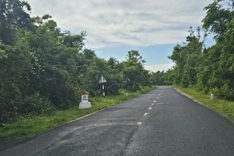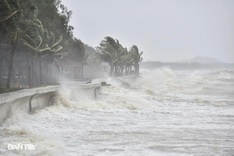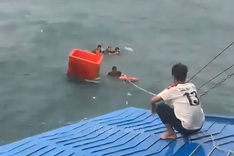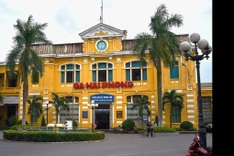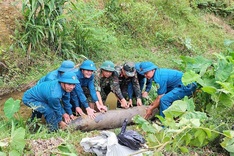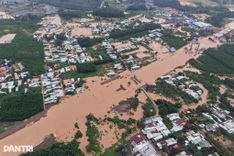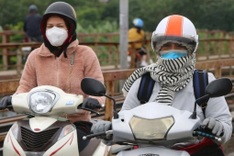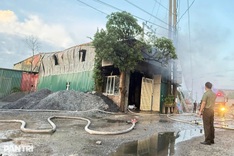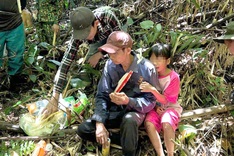In a unified effort to lift the European Commission's "yellow card" warning by the end of the year and promote sustainable development in the fishery sector, the coastal provinces in the southern Red River Delta are taking stringent measures to combat Illegal, Unreported, and Unregulated (IUU) fishing.
Leadership responsibility
The 2017 "yellow card" warning from the EC marked a challenging time for Vietnam's fisheries sector. Over the past six years, both central and local authorities, including those in the southern Red River Delta, have made significant strides to address this issue. The coastal provinces of Nam Định, Thái Bình and Ninh Bình have diligently taken measures in line with the Government's directives to combat IUU fishing.
These measures have been communicated to local authorities, particularly in coastal communes, with agencies intensifying efforts to eliminate the "yellow card". Initiatives include educating fishermen on legal compliance, enforcing regulations, and increasing patrols, inspections, and monitoring.
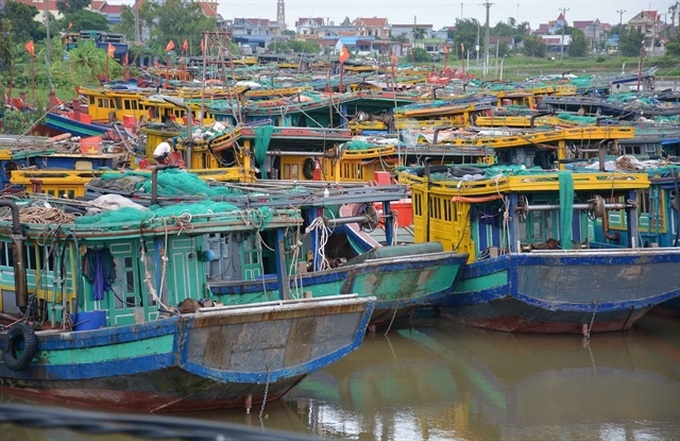
Nam Định, with the highest number of fishing vessels—over 1,760—has issued directives to enhance monitoring, reporting, and strict enforcement of regulations to meet international standards.
Hoàng Mạnh Hà, director of the Nam Định fishery sub-department, highlighted the collaboration with coastal localities and the coast guard force to improve legal compliance among fishermen and secure commitments from vessel owners to avoid violating international fishing boundaries. The provincial government is holding local leaders accountable for IUU violations.
In Hải Hậu District, a key fishing hub with 192 vessels and over 1,000 workers engaged in offshore fishing, increased inspections and guidance on compliance, including the installation of tracking devices and maintenance of accurate fishing logs, are strictly enforced.
Thái Bình, with a coastline of 52km and a sea area of over 3,000sq.km, has also linked the fight against IUU fishing to local leadership responsibilities.
All 706 registered fishing vessels are equipped with tracking devices and certified for food safety, according to Hoàng Minh Giang, director of the provincial fishery sub-department. To date, no violations of foreign waters or illegal fishing have been reported.
In Ninh Bình, the provincial Department of Agriculture and Rural Development signed a coordination plan with neighbouring provinces on May 12, 2023. This plan outlines measures for monitoring fishing vessels, managing catch volumes, and combating illegal fishing for 2023-25. Numerous documents have been issued to coordinate efforts against IUU fishing.
Supporting fishermen
To address challenges in enforcing IUU fishing regulations, Thái Bình launched public awareness campaigns and introduced financial support policies. The province's 2020 resolution funded the purchase and installation of tracking devices on fishing vessels, increasing the number from 30 to 176 out of 181 eligible vessels by 2023.
A subsequent resolution subsidised satellite subscription fees for these devices, covering 50 per cent of the annual cost, up to VNĐ2 million (US$800) per vessel per year. Compliance with tracking device regulations is mandatory to qualify for support.
The coast guard force plays a crucial role in combating IUU fishing and supporting sustainable development. Lieutenant Colonel Vũ Chí Công of the Hải Thịnh coast guard base in Nam Định reported that his force monitors vessels and educates fishermen on IUU regulations.
Colonel Trần Văn Kha at Ninh Bình’s coast guard base emphasised proactive measures to raise public awareness and conduct sea patrols, supporting sustainable marine economies and improving fishermen's awareness of resource protection and national sovereignty.
From awareness to action
Nguyễn Văn Cường, a fisherman in Kim Đông Commune, Kim Sơn District, Ninh Bình, previously fished without specific area restrictions. Following instruction on IUU regulations, Cường now adheres to legal requirements, including proper vessel marking and fishing zone compliance.
In Nam Định, authorities have effectively managed fleet operations and improved fishermen's understanding of IUU regulations.
Cao Thị Nga, head of the Nam Định Fishery Inspection Office, noted increased compliance in reporting and logging, with no incidents of vessels being detained by foreign authorities. By May 15, 533 out of 542 vessels had installed tracking devices, reaching 98.34 per cent.
In Thái Bình, the provincial Department of Agriculture and Rural Development conducted eight inspections in the first six months of the year, imposing administrative fines totalling VNĐ550 million for violations related to tracking device installations and other infractions.
Protecting natural resources
With nearly 150km of coastline, Thái Bình, Nam Định and Ninh Bình offer substantial opportunities for maritime economic development. To remove the EC’s “yellow card”, these provinces are restructuring their fisheries sectors for sustainable development, aiming to enhance livelihoods and improve the quality of life for fishermen.
Ninh Bình has prioritised brackish water aquaculture in coastal sedimentary zones, resulting in higher economic returns compared to traditional methods. Kim Sơn's fishery catch reached over 36,000 tonnes in 2023.
Thái Bình boasts a significant seafood stock, estimated at 26,000 tonnes of fish, shrimp, and squid, with an annual production of around 18,000 tonnes.
The province aims for a 3.2 per cent growth in aquaculture this year, targeting a production value of VNĐ6.13 trillion and a total seafood catch of 397,000 tonnes.
Nam Định is developing larger vessels for offshore fishing and has two operational ports, ensuring safe docking and compliance with regulations.
Sustainable exploitation
The National Programme for the Protection and Development of Fishery Resources up to 2030 integrates patrols, inspections, and resource management with sustainable fishing and combating IUU fishing.
Tackling IUU fishing has become a core component of sustainable fisheries development in Vietnam.
Trần Đức Việt, deputy director of Nam Định's Department of Agriculture and Rural Development, emphasised the continued restructuring of the agricultural sector, focusing on reducing coastal fishing vessels and enhancing offshore fishing capacity. The province is also developing logistics support fleets and improving infrastructure for storm shelters.
Thái Bình aims to become a leading agricultural production hub in the Red River Delta, focusing on modernising agriculture and improving the value chain for its agricultural products. The province is enhancing science and technology applications in aquaculture and fishery processing to meet domestic and export demands.
Colonel Lâm Mạnh Hồi, deputy commander and chief of staff of Thái Bình coast guard base, said that the provincial coast guard force had issued resolutions and long-term plans to end IUU violations. They were increasing patrols and inspections, addressing issues such as loss of connection, expired licences, and unregistered vessel transfers, with the goal of restoring the “green card” for the fishing industry.
In October, the EC will conduct its fifth inspection of Vietnam’s efforts to combat IUU fishing, a critical assessment that will determine whether Vietnam can remove the EC "yellow card".

